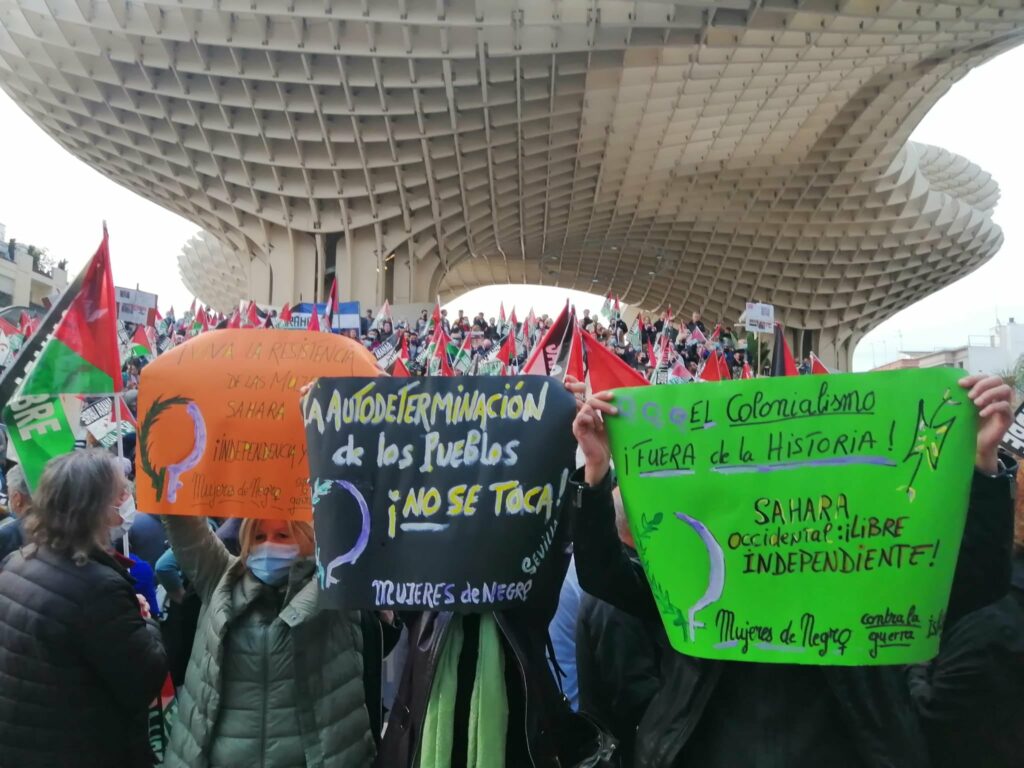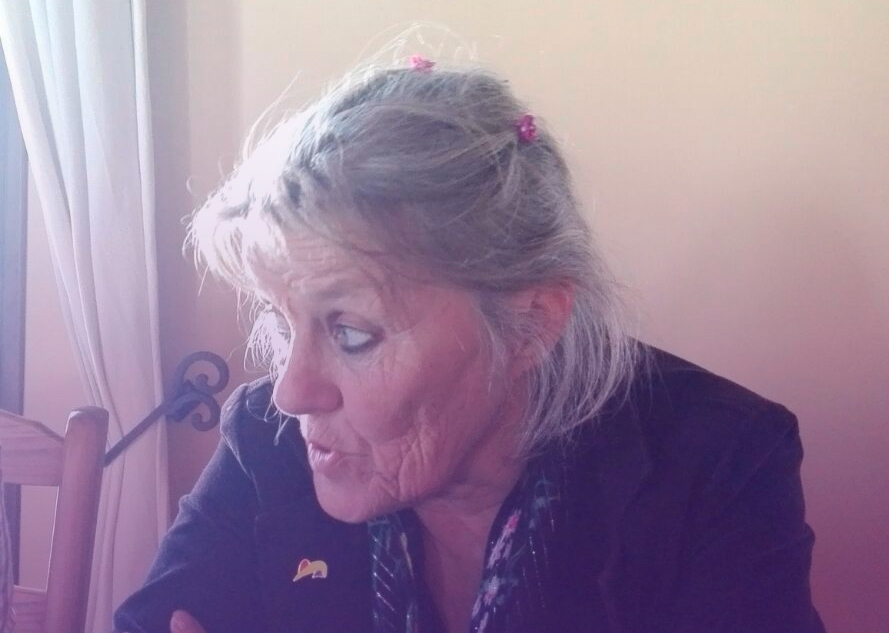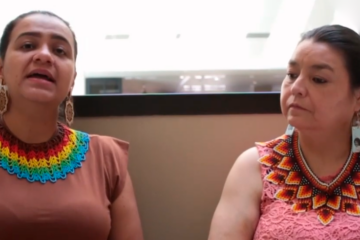Mireya Forel was born in Switzerland in 1952 and, since 1976, has been living in Seville, capital city of Andalusia, in the Spanish state. During her adolescence, she lived in France, and told us that, during that period marked by the Cold War, “there was a quite subtle, but at the same time brutal, repression. With May 1968, the need to speak up, the need for plurality, for the expression of the left-wing thought emerged”. An active militant from a young age, Mireya says: “I didn’t want to be a spokesperson for any party; to the contrary: I wanted to bring the whole knowledge of movements to what was called party and encourage the existence of autonomous women’s organizations”.
In this interview she gave to Capire, Mireya Forel talks about the trajectory of the international anti-militarist feminist movement Women in Black and its contribution to the fight against wars and colonialist forms of violence, from an anti-patriarchy perspective. Read below the interview or listen to the audio version in Spanish.

How did you first get involved with Women in Black?
I came to know Women in Black in 1991, when a new ferocious imperialist aggression started to spread across Iraq and Yugoslavia. In the Spanish state, the anti-militarist movement was gaining momentum. In other European countries, there was an aura of worship to the Armies due to their role in the liberation from Nazism. There is a militarized pacifist mindset which translates into the statement: “We fought against Nazism, which is the ultimate horror of militarism, but, deep inside, we accept the Army”.
The Movement of Conscientious Objection (MOC), initiated by young Christians and adopted mostly by young people from left-wing extra-parliamentary groups, gave rise to a youth movement that strongly defended the refusal to submit to military service. During the same period, not far from there, the war we know today as Balkan Wars was escalating. Departing from Madrid and Castela region, people from MOC visited former Yugoslavia. In the city of Belgrade, they encountered a group called Women in Black and noticed this was the only group with a well-defined position against militarism. A concurrence of love and politics.
Then, between 1992 and 1993, I started a process in my life in which I focused on creating networks as from Women in Black, and this came to define my position as clearly decolonial. To fight against war, we need to decode what makes it so accepted as a means of conflict resolution. When talking about violence in times of war, we decode and demystify some points, the first one being the very notion of war.

Could you talk a bit more about the actions of Women in Black?
At the time of the Balkan Wars, horrific events were happening in Africa, and no one was talking about that. There was a media culture inducing people to assimilate war in Africa as normal, while they felt surprised by the fact that a war was happening in Europe, since people assumed that Europe had already gone over this kind of thing.
Women in Black emerges in a country that resulted from colonialism, which is Israel. It emerges in a horror zone, comparable to war. Women in Black emerges from the decision of feminists disgusted by the situation of extreme violence — although, as a matter of fact, any form of violence is extreme — and who take to the streets wearing black. Italian left-wing feminist women, while trying to get in contact with Jewish Israeli women to collaborate during the withdrawal from Palestine, met the Women in Black, and, amidst all this, we showed up, from several parts of the Spanish state.
An amazing idea Women in Black had was to organize meetups among women from states at war and from states where there is no peace, even though there is no declared war. We tried to work for peace by creating bonds among women divided by the nationalist patriarchal hatred. We’ve denounced rape as a weapon of war and, at the same time, we’ve fought against the political instrumentalization of rape, including within NGOs that treat women as victims.
Women in Black who work in conflict zones, such as Serbia, may talk about that, as well as those who are in the Latin –American continent or, rather, Abya Yala. I don’t want to speak over them. We are messengers of whatever they, women silenced by war, want to say. We won’t create assistance projects that take away their protagonism. In Europe, we supported the creation of counterinformation. We’ve fought against the militarization of our societies and denounced every act of NATO. The European Union is involved in thousands of conflicts, but not all of them are known.

2022 was marked by the issue of war due to the conflict between Ukraine and Russia. What is your view on the disparity between the commotion and attention dedicated to the wars in Europe and to those outside Europe nowadays?
It was and still is evident that the issue involving Afghanistan, for instance, wasn’t clear for many pacifists. In Seville, we’ve campaigned against NATO on a regular basis for years. But many pacifist comrades were and keep being lured by the pro-invasion propaganda, which is intentionally made using women-related issues. To analyze the Taliban problem, it is necessary to denounce who fabricated the Taliban and where it came from. One can’t just keep looking at what the screens show, at what is on the surface. We need to understand the process. We try to avoid the silence about war, and it requires the huge effort of knowing what is going on.
The things that are happening in some parts of Africa are terrifying. Massacres targeting much more than four or five women. They get to the point of slaughtering entire villages. In Mali, in Congo, and in many other places, the first people to be assaulted, raped, and killed by the destabilization policy are women. Our work demands us the effort to get closer to what we are not familiar with in the West because we believe we have monopoly over information.
When I share information reported by people who are resisting colonization, people ask: “Are you sure?”. I answer: “Yes, I’m sure, because the information comes from people who are suffering in that country, and they know what’s happening there”.
Believing that Europe holds the truth and the reason, that it is a democracy where there is more information than in any other place, is a form a coloniality.
Could you talk about the violence against women as a war tool?
I don’t know all of human history, even because humanity has different views on universality and distinct landmarks. Many great civilizations of impressive magnitude existed before the dawn of Europe with its Judeo-Christian tradition. It is curious that, at schools, when the topic of wars and battles is addressed, they talk about the Roman civilization minimizing the fact that Romans made actual war and focus on the assumption that they brought civilization. But when they talk about the Islamic world, they talk of invasion.
Europeans themselves, when conquering other territories, appropriate women, making them domestic slaves and sexually abusing them. In the 14th century, Europe could not easily reach the Asian part of the world because the Islam held control over the path. So Portugal went to Africa through the West and started stealing, deporting, and slaving African men and women. Slavery included the right to rape and appropriate women.
It is necessary to review this whole idea of what war is. To me, slavery is, in fact, a war. There was no “discovery of America”; there was a war of conquest.
It was not built into our consciousness, in the collective memory. People fear talking about collective memory because that means rediscovering our own origins and facing the fact that our Western civilization was born in a universe of possessiveness; a society based on the right to manipulate those who don’t belong in it. Every conquest, every invasion, every occupation is accompanied by appropriation not only of land, but also of people.
Rape is a weapon of war. War is deciding, for the other, about their present and their future. According to the European ethnocentrism, the way of saying to a man he is not a man is saying to him: “You’re not capable of defending your land nor of defending your wife”. The white man headed to Asia and Africa with such a mindset to rob human beings from their lands.
There was resistance, entire armies organized by women. No one talks about that, because they always talk about the enslaved person as a poor man from a poor continent… They erase the entire memory of extraordinary and intricate, creative cultures that truly know the energetic force of what we call nature. In the struggles against slavery in Brazil, in Colombia, as well as in other countries, women were important protagonists, and not these passive victims.
When Nazism was overthrown in Europe, the Americans who landed in Normandy – many of whom were Black men, sent as cannon fodder — were glorified with propaganda that depicted them as the Europe saviors, although everyone knew the Soviet Union was the main military force against the Nazis. But something happened there; something that had been erased, but is now revealed: when they landed in Normandy, these Americans had the right to possess French women. There was a mass rape of French women by the soldiers who came to set France “free”.
Many times, we can tell by women’s behavior that something happened. At war times, all women know they are in danger. When there is a situation of violence, we women all know that. But, in movies, the rapist is always the enemy. During the Balkan Wars, it became evident the increase of abuse in society on the part of the very men who fought for the country. When such men go back home from the battlefront, they are violent with their wives and daughters, with whomever lives with them, because these men feel they own them.
Regarding memoricide, what resources can be used to maintain collective memory?
This is a huge work still to be done in Europe. I’ve noticed that, within our Western feminism, in Europe, in Canada, in the United States, there is a sector that ignores the need for such memory. This sector is convinced that the most important factor is to conquer rights, instead of taking into consideration the notion of development of our societies. The need for rights exists because of injustices, so we should look for the reason why such injustices exist. Does patriarchy produce sexism and heterosexuality? Or does it go beyond that?
What types of values and of men are being created? What type of society is being created? If you don’t question this patriarchal supremacy that organizes a whole view of life, you end up being part of a stunted memory.
We talk about capitalism, but we need to be careful, because if the development of a society that advances toward socialism carries with it the values of our modern civilization, it will end up being a patriarchal, authoritarian, and dangerous society. It happened in the decline of Eastern European countries because their worldview has quite European roots. But there may be alternatives in more interesting countries, such as in African countries. The determination to reclaim traditional roots in terms of agriculture and worldviews enable them to have a broader range of possibilities to break with this dangerous modernity that is leading to our suicide as humanity. If we believe that every modern societal transformation lies in nationalizing banks and public goods, and we accept the values of our civilization, we will just reproduce really serious problems. That is why memory is important.
Europe has lost much of its memory. We can recollect the memory of bad events that happened outside, but we lost much of the historical memory of what the resistance of craftspeople and peasants against monoculture and large estates was. On the other hand, the peoples who were dominated by the European empire have many memory resources. I learn more from the peasant movement of Abya Yala, from the Indigenous movement, and from the Pan-Africanists than from our own culture.




